By gosh, I didn’t think Ikuhara had it in him.
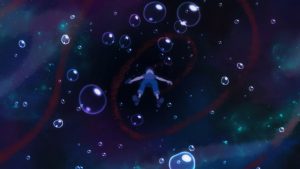 The first thing I want to say is, thank goodness – that arguably the most erratic director in anime chose this most mediocre of anime years to deliver his “A” game. It’s been a pretty brutal six months in anime, and we needed Sarazanmai to be everything it turned out to be – and so much of what it turned out to be was surprising. It wasn’t so much that it wound up being a good series, as that’s always a possibility but always a crapshoot with Ikuni, but the manner in which it went about its business. This was a wholly Ikuhara show, yet totally unlike anything he’s done before.
The first thing I want to say is, thank goodness – that arguably the most erratic director in anime chose this most mediocre of anime years to deliver his “A” game. It’s been a pretty brutal six months in anime, and we needed Sarazanmai to be everything it turned out to be – and so much of what it turned out to be was surprising. It wasn’t so much that it wound up being a good series, as that’s always a possibility but always a crapshoot with Ikuni, but the manner in which it went about its business. This was a wholly Ikuhara show, yet totally unlike anything he’s done before.
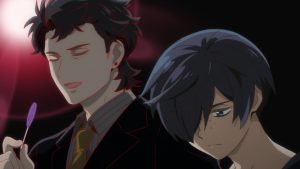 I think, ultimately, the Tsuritama connection is the strongest with Sarazanmai, though this series certainly wasn’t on the same level. Both represent freakishly talented (not least visually) directors showing us a warmer, more human side of themselves. Both saw directors for whom discipline is often a problem (as Nakamura Kenji has reminded us since) deliver their most concise and consistent series ever. And both celebrate the emotional volatility and ultimately the vulnerability and resilience of adolescent boys with whimsy and affection. If Sarazanmai doesn’t leave you smiling, at least a little, perhaps you’re a fairly cynical viewer.
I think, ultimately, the Tsuritama connection is the strongest with Sarazanmai, though this series certainly wasn’t on the same level. Both represent freakishly talented (not least visually) directors showing us a warmer, more human side of themselves. Both saw directors for whom discipline is often a problem (as Nakamura Kenji has reminded us since) deliver their most concise and consistent series ever. And both celebrate the emotional volatility and ultimately the vulnerability and resilience of adolescent boys with whimsy and affection. If Sarazanmai doesn’t leave you smiling, at least a little, perhaps you’re a fairly cynical viewer.
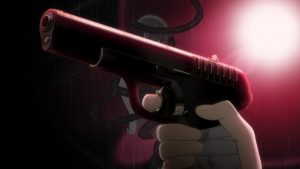 While Ikuhara is obviously besotted with big ideas (and tragedy), with this show he wound up focusing on fairly straightforward themes and hope rather than despair. Sarazanmai and Mawaru Penguin Drum are the duality of modern Ikuni anime – if this series is Keppi, MPD is Darkness. MPD chose A Night on the Galactic Railroad – one of the most subtly tragic works in Japanese literature – as its template. It focused on the Sarin gas attacks as its psychological center, a deeply unsettling event which rattled the Japanese psyche to its core and which still reverberates to this day. Sarazanmai looked back on the Great Kanto Earthquake of 1923 – in truth a stand-in for the Tohoku earthquake and tsunami of 2011 which profoundly effected Ikuhara – a blameless disaster from which eventual recovery came. It all fits, really.
While Ikuhara is obviously besotted with big ideas (and tragedy), with this show he wound up focusing on fairly straightforward themes and hope rather than despair. Sarazanmai and Mawaru Penguin Drum are the duality of modern Ikuni anime – if this series is Keppi, MPD is Darkness. MPD chose A Night on the Galactic Railroad – one of the most subtly tragic works in Japanese literature – as its template. It focused on the Sarin gas attacks as its psychological center, a deeply unsettling event which rattled the Japanese psyche to its core and which still reverberates to this day. Sarazanmai looked back on the Great Kanto Earthquake of 1923 – in truth a stand-in for the Tohoku earthquake and tsunami of 2011 which profoundly effected Ikuhara – a blameless disaster from which eventual recovery came. It all fits, really.
 Sara summed up what Ikuni was trying to say with this series pretty well, I think – “The dish is the vessel of life. If it has form, it will one day break and be lost. Only those who connect their desires through the pain of loss can take the future in their hands.” Or as Keppi himself said, “The future is not necessarily a bright one. Hope and despair are both one with life.” This was a happy ending by Ikuni standards, to be sure, but grounded in acceptance. Pain and loss are the inevitable toll to be paid for choosing to live, and to connect. They prove that we’re alive, and that we lived. Connecting means being prepared to lose, and to suffer. But what’s the alternative?
Sara summed up what Ikuni was trying to say with this series pretty well, I think – “The dish is the vessel of life. If it has form, it will one day break and be lost. Only those who connect their desires through the pain of loss can take the future in their hands.” Or as Keppi himself said, “The future is not necessarily a bright one. Hope and despair are both one with life.” This was a happy ending by Ikuni standards, to be sure, but grounded in acceptance. Pain and loss are the inevitable toll to be paid for choosing to live, and to connect. They prove that we’re alive, and that we lived. Connecting means being prepared to lose, and to suffer. But what’s the alternative?
 That Ikuhara could evoke such power through simplicity is not that surprising – he’s always been a remarkably literate artist. But it’s gratifying that he chose such a message here, that he embraced something so life-affirming even if he did it in his usual dark and turbulent way. And obviously, it’s gratifying that he pulled it off – including sticking the landing. I’ve speculated that the 11-episode format, limiting though it may be, might have turned out to be the best vehicle to force Ikuhara to concentrate on the bare essentials of his story and cut out all the extraneous stuff – which, in the end, seems to have been a net positive.
That Ikuhara could evoke such power through simplicity is not that surprising – he’s always been a remarkably literate artist. But it’s gratifying that he chose such a message here, that he embraced something so life-affirming even if he did it in his usual dark and turbulent way. And obviously, it’s gratifying that he pulled it off – including sticking the landing. I’ve speculated that the 11-episode format, limiting though it may be, might have turned out to be the best vehicle to force Ikuhara to concentrate on the bare essentials of his story and cut out all the extraneous stuff – which, in the end, seems to have been a net positive.
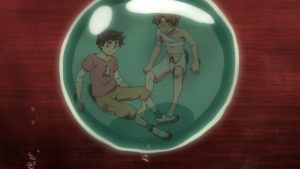 As far as the boys are concerned, it was Toi who had the decision to make in the end. Kazuki and Enta reached their existential decisions last week, and even if there was no resolution as to Enta’s romantic feelings, both had clearly decided to embrace their connections and the pain that goes along with them. For Toi, though, life itself being worth continuing wasn’t a slam-dunk. He lost his brother, and more, saw first-hand what his brother truly was (which I think he knew, but it was a stark reminder). What’s more, Toi may have had it in him to pull the trigger, but he’s not the sort of kid who could repeatedly take lives and not carry the scars with him – no matter how justifiable those acts may have seemed in the moment.
As far as the boys are concerned, it was Toi who had the decision to make in the end. Kazuki and Enta reached their existential decisions last week, and even if there was no resolution as to Enta’s romantic feelings, both had clearly decided to embrace their connections and the pain that goes along with them. For Toi, though, life itself being worth continuing wasn’t a slam-dunk. He lost his brother, and more, saw first-hand what his brother truly was (which I think he knew, but it was a stark reminder). What’s more, Toi may have had it in him to pull the trigger, but he’s not the sort of kid who could repeatedly take lives and not carry the scars with him – no matter how justifiable those acts may have seemed in the moment.
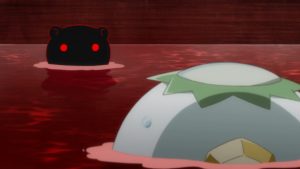 It’s very emblematic of what a departure this show was for Ikuni that there was no other shoe to drop with Keppi – he could be a tool, but he was no Kyuubey. He cried for Reo and Mabu, and he really did have the interests of the boys at heart. I also suspect a bit of hilarious self-parody in Ikuhara showing us Otter’s end with the words “I am a concept”. Keppi had a decision to make, too – in order to allow the boys to salvage their future, he had to embrace his own (literal) darkness. That was a moment of Ikuhara depth to be sure – the symbolism there packs a serious punch.
It’s very emblematic of what a departure this show was for Ikuni that there was no other shoe to drop with Keppi – he could be a tool, but he was no Kyuubey. He cried for Reo and Mabu, and he really did have the interests of the boys at heart. I also suspect a bit of hilarious self-parody in Ikuhara showing us Otter’s end with the words “I am a concept”. Keppi had a decision to make, too – in order to allow the boys to salvage their future, he had to embrace his own (literal) darkness. That was a moment of Ikuhara depth to be sure – the symbolism there packs a serious punch.
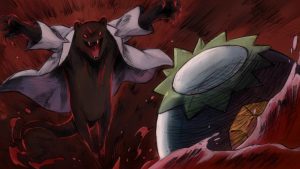 One can make many interpretation of the ending events, I suppose. Just how exactly did Reo and Mabu manage to shine the light that allowed the boys to reach their goal (the 10 year-old Kazuki) and deliver the miçanga? Do they live on inside Keppi, or literally? What does seem clear is that Toi spent some time in juvenile detention, and that on his release he jumped into the Kandagawa. Was he thinking on ending his life, or was he symbolically diving back into it? Kazuki and Enta weren’t about to allow him to go either way, but I choose to believe the latter – rather than giving up hope, he was symbolically immersing himself in life again.
One can make many interpretation of the ending events, I suppose. Just how exactly did Reo and Mabu manage to shine the light that allowed the boys to reach their goal (the 10 year-old Kazuki) and deliver the miçanga? Do they live on inside Keppi, or literally? What does seem clear is that Toi spent some time in juvenile detention, and that on his release he jumped into the Kandagawa. Was he thinking on ending his life, or was he symbolically diving back into it? Kazuki and Enta weren’t about to allow him to go either way, but I choose to believe the latter – rather than giving up hope, he was symbolically immersing himself in life again.
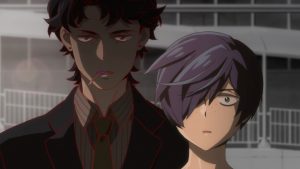 This may have been a bit of a happy ending for the age of climate change, Trump and Abe, but for Ikuhara it still represents probably his most hopeful and earnest statement as a writer. What exorcised Otter wasn’t a banishment of pain of suffering, but an acceptance of them. Whether the future is bright or not, we don’t get to choose – we only get to choose whether we have the courage to face it. Often in literature we see a struggle between possibility and regret, but even if we choose possibility, we accept that possibility is a double-edged sword. We accept it in all its faces, and resolve to do our best whatever happens. That’s as life-affirming as it’s ever gotten for Ikuni, and Sarazanmai is as on-point and coherent as anything he’s ever done. We’ll be seeing it around here at the end of the year, of that I have no doubt.
This may have been a bit of a happy ending for the age of climate change, Trump and Abe, but for Ikuhara it still represents probably his most hopeful and earnest statement as a writer. What exorcised Otter wasn’t a banishment of pain of suffering, but an acceptance of them. Whether the future is bright or not, we don’t get to choose – we only get to choose whether we have the courage to face it. Often in literature we see a struggle between possibility and regret, but even if we choose possibility, we accept that possibility is a double-edged sword. We accept it in all its faces, and resolve to do our best whatever happens. That’s as life-affirming as it’s ever gotten for Ikuni, and Sarazanmai is as on-point and coherent as anything he’s ever done. We’ll be seeing it around here at the end of the year, of that I have no doubt.
Epilogue:


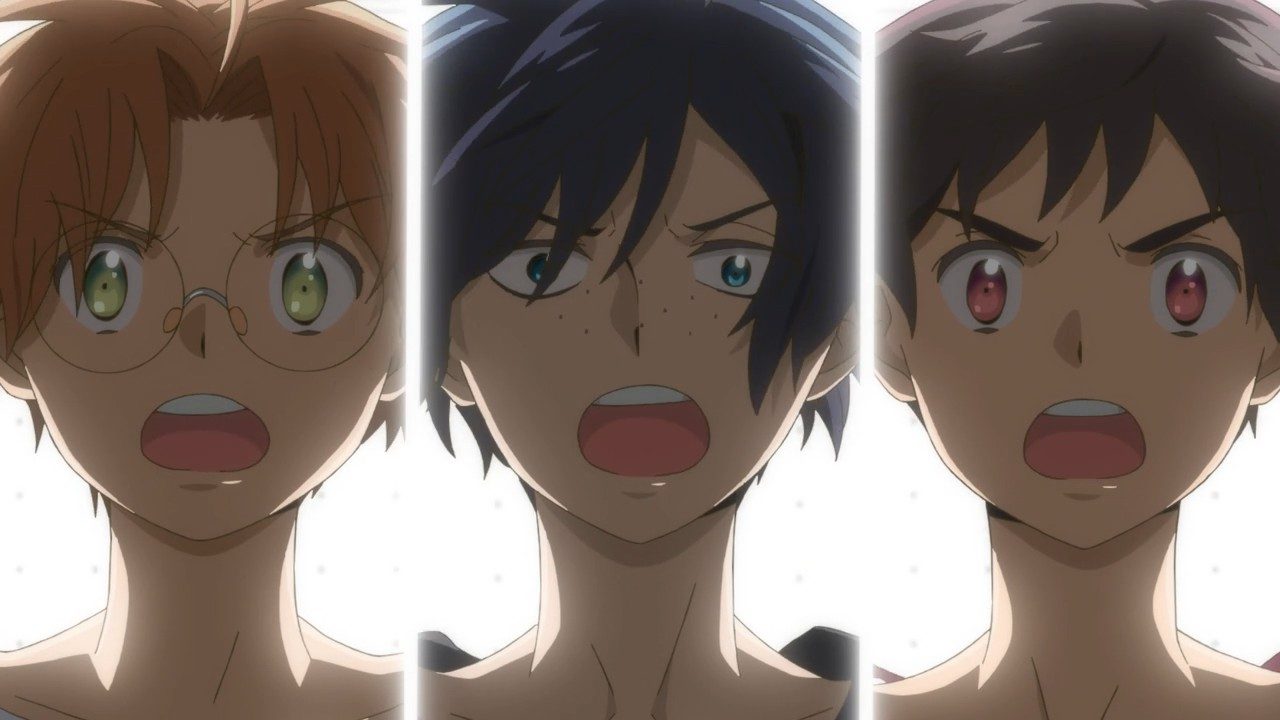

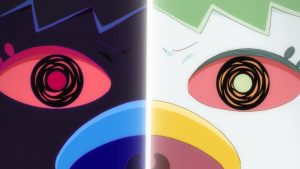
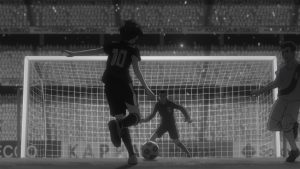
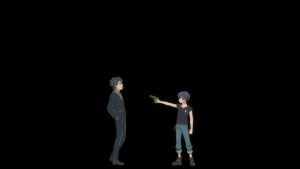
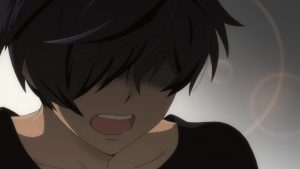
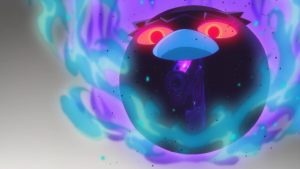
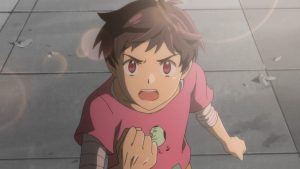
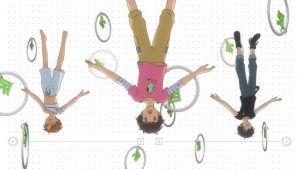
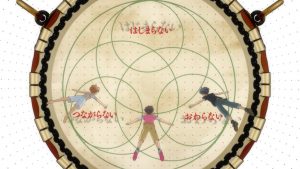

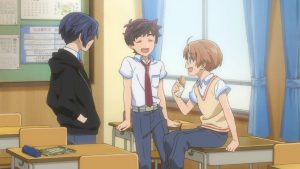

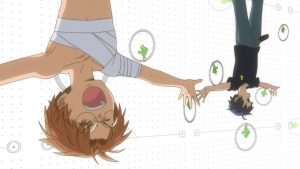
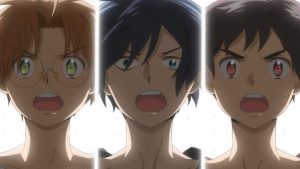
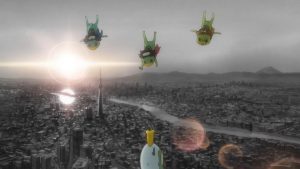
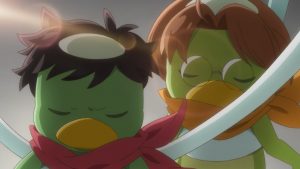
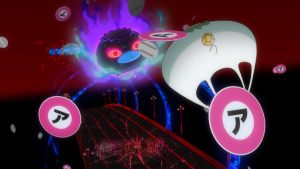
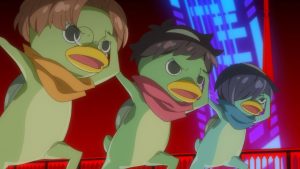
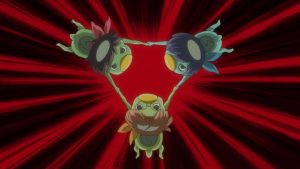
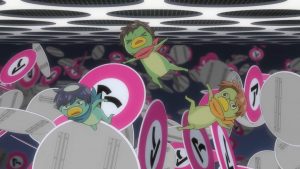
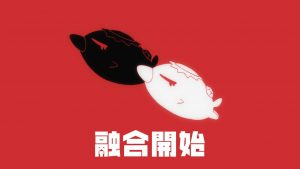
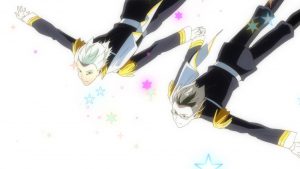
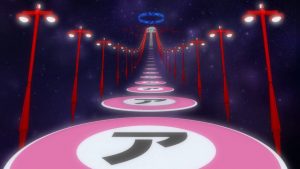
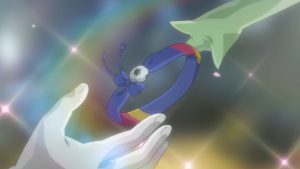
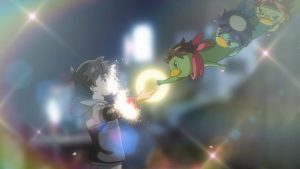
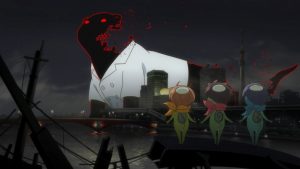

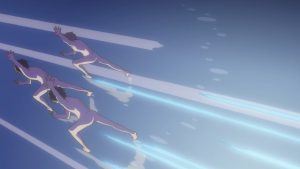
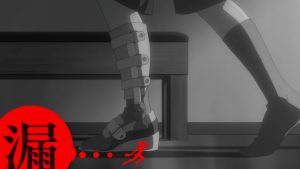
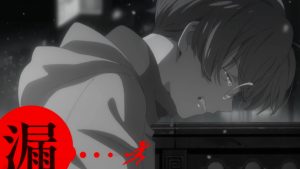
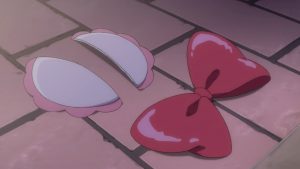

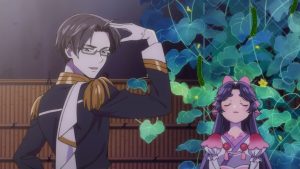

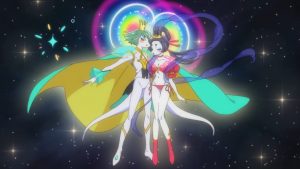
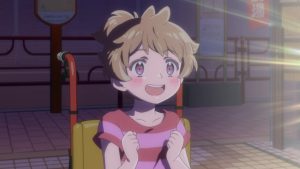
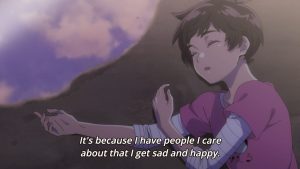
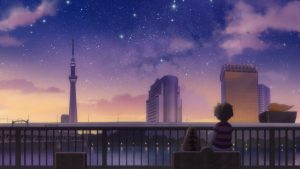
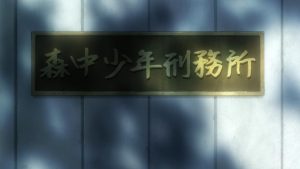
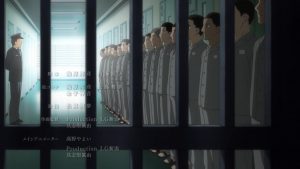
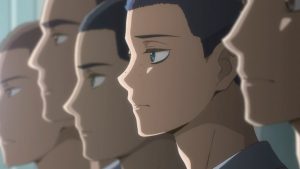
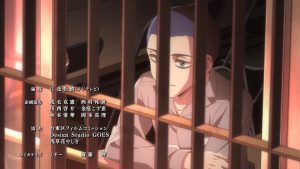
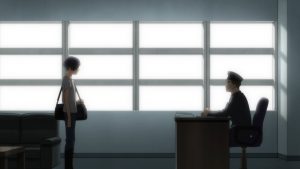
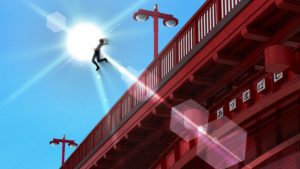
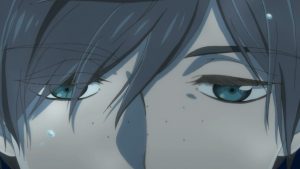
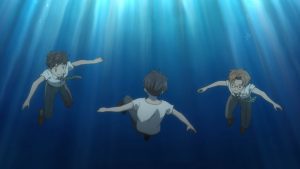
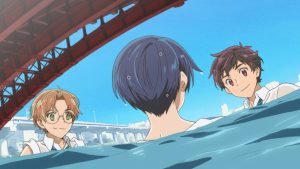
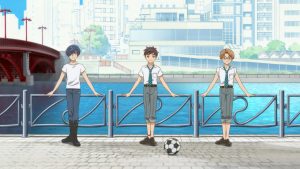
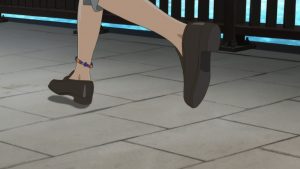
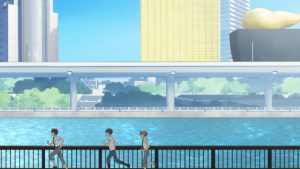
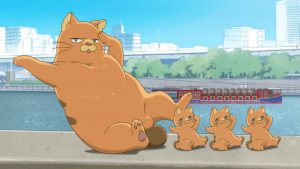
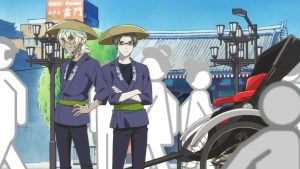
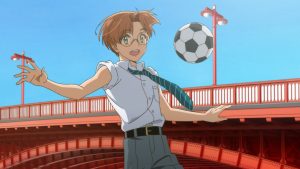
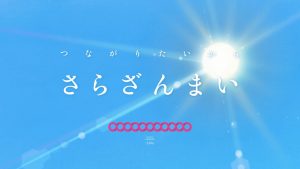
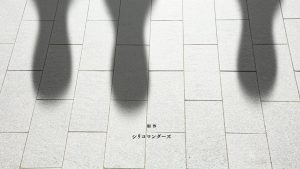

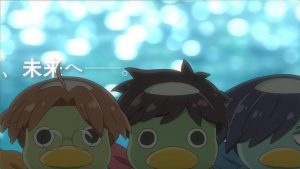
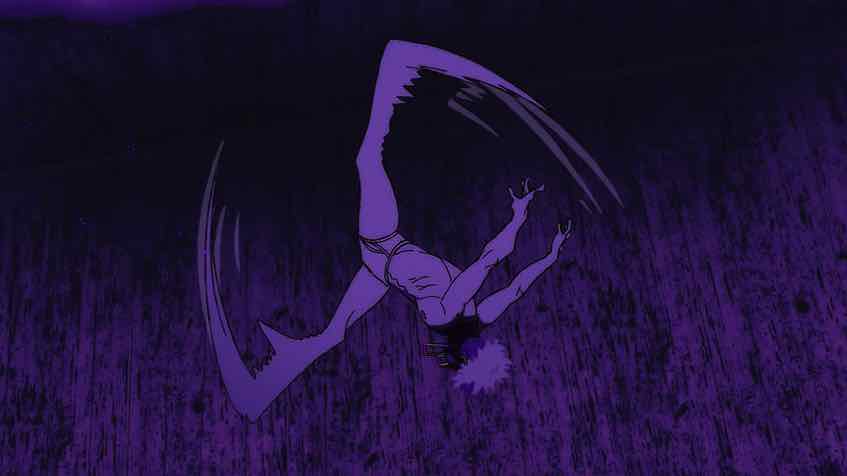
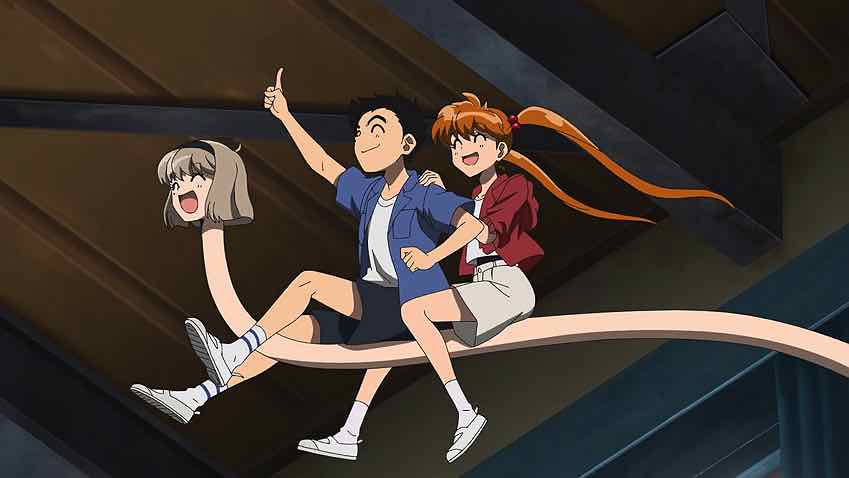
Simone
June 21, 2019 at 10:53 pmYep, I didn’t go into this expecting it to be ultimately this optimistic and even wholesome, but here we are. It was a great ride, and personally I loved all of it, including the initial repetition that entirely paid off once the pattern was broken. Also, a bit of an aside, but I loved the music of this show. OP, ED, the insert songs. It’s remarkable I guess that musically this show struck me far more than the Watanabe one *about music*, but that may be as much Carole & Tuesday’s fault as it is Sarazanmai’s merit.
Anyway, a solid recommendation – at least to anyone who’s not too squeamish at the notion of kappas sucking soul-spheres out of boys’ asses…
Guardian Enzo
June 21, 2019 at 11:33 pmYes, the music was really good. Well worth singling out for praise (especially the ED).
Gracie
June 21, 2019 at 10:58 pmWhat a relief. You couldn’t hope for a better ending.
Yukie
June 21, 2019 at 10:59 pmThis was such a gem. I honestly didn’t think a show with a first episode that grossed and shocked me to my core could become one of my favorite shows this past few years. The plot was by no means perfect, but the animation, seiyuu performances, setting of the story, and direction were all excellent. I was so surprised by the elegant way they used all the episode titles for the finale. There were some parts I simply figured to be Kappa magic (like the Reo and Mabu part lol), but overall I think the themes and presentation really meshed well and tied up the entire series neatly. The messages and symbolism were surprisingly clear for an Ikuhara show (I still haven’t figured out what the “A” signs stand for though…Asakusa?), and it’s so satisfying to understand and enjoy them as what you see on the screen (yup, I didn’t enjoy MPD). I can’t believe that I am actually looking forward to Ikuhara’s next show.
Thanks for this wonderful review of the finale! I didn’t know about the connection with the Tohoku earthquake, and it was through your reviews that I was able to appreciate this show even more.
TheYepMan
June 21, 2019 at 11:32 pmI do have a few issues with the finale. In contrast to the jaw-dropping, perfectly paced and written episode 9, episodes 10 and 11 are just… “We’re supposed to wrap up now, so let’s get this over with”. There are lots of things in them that I think weren’t developed as much as they should’ve, not just Reo and Mabu (who, as much as I’m happy to see not joining the ranks of Bury Your Gays… what even the fuck was that return?) but the entire concept of the Otter was, IMO, under-explored – or at least under-featured. I’d definitely say this show could’ve used at the very least a 12th episode. Maybe a 13th.
However, this is still not just the best anime of the season for me, but the best anime I’ve watched *in a while*. You said it yourself, this is Ikuhara bringing his A game in a time of almost everyone else phoning it in, and I’m not afraid of counting this show as a New Classic, no matter how many aside glances and raised eyebrows I get after people go through every shirikodama-related scene. If I didn’t know better about my anime-watching acquaintances and their tastes and opinions, I’d walk back what I told them about “if you want to watch good anime these days you need to dig out the classics you didn’t watch” by adding “or watch Sarazanmai” at the end.
Guardian Enzo
June 21, 2019 at 11:35 pmFor all the problems I have with Ikuni (and let’s remember, with Sarazanmai it will likely be two of his last 3 series in my year-end Top 10s) I love how uncompromising he is with his vision. It can drive you crazy (MPD), it can flame out disastrously (YKA). But in an age when anime is increasingly safe and stale, it’s needed more than ever.
JJ
June 22, 2019 at 2:18 amI suspect MP100 S2, Dororo & Vinland Saga (assuming no major hiccups with the latter two) will still be my top three series of the year, but I was not expecting an Ikuhara series to be in pole position for “best of the rest”.
It’s been a very long time (nigh-on two decades), but to finally have another Ikuni show reach into my butt and extract my desires so powerfully has been a treat.
Rasu
June 22, 2019 at 3:22 amWell, what I understood about Reo and Mabu is that they managed to came back because they did the Sarazanmai before Mabu confessed his love to Reo, so they didn’t fall out of the circle since they were still conected with each other, they protected their conections like the boys through the Sarazanmai.
And to me, just as the war between kappas and otters already appeared as a wink in MPD Ringo’s memories of their parents; Mabu and Reo becoming a shooting star that brought them hope and conected the desires the otter had isolated, it remind of Yurikuma’s Kumalia, since Kumalia was “real love” that became shooting stars (and the bears court) which also were “the promised kiss” (which you only give to your one and only love, just as Mabu referres to Reo by the way), so, to me it was another wink to that work and how “love prevailed at the end, and cutted through dispair to conect and bring hope”, it was truly beautiful to me, it made me feel that finally all made sense in a very beautiful way… but maybe I’m overthinking.
Yet again, this show and MPD are now my favourites of Ikuhara, I consider both masterpieces and classics. That last episode was great and marvelous, every single minute of it was so well executed and until the very last second they made every single second worth, I liked that.
Rasu
June 22, 2019 at 3:40 amI want to add that, well, kappas usually grab kids on the rivers shore so that they get drown, but it wasn’t kappas who get Kuji drowned (and the rest of the boys), it was his own cirumstances, ego,attitude, decisions and conflicts which drowned him (and them) to the bottom of despair, yet, it was kappa’s sarazanmai which allowed him to learn to dive in “life,conections and circumstances” river, so as he could survive though his way to adulthood.
I liked a lot Keppi’s last gift and how they decided to react to it., it was a wholesome experience.
Scampi
June 22, 2019 at 3:43 amCoincidentally, before this episode aired I was vaguely thinking that the only way for the Kuji brothers to have happy ending was for Chikai to get caught and somehow start a new life learning to trust others. Turns out Ikuni really threw Toi in detention makeover for the happy end and at same time slammed viewers back into the real world. It’s sooo very grounded for an Ikuhara show. The supernatural kappa vs evil otters adventures have little impact on their relationships in the normal world, the boys came through because they’re humans that we can all relate to.
In hindsight, Enta rebutting Katsuki’s repeated attempts at self sacrifice is a heartening inversion of MPD.
Marty
June 22, 2019 at 11:50 amThis show is AMAZING.
In an era of “read the manga” or “hope for a season 2” endings, it’s extremely gratifying watching a series that not only concludes magnificently in 11 episodes, but thrives in that format. I think 91 Days was the last anime that I watched that truly felt complete in such a short format (not too short, but not too long either).
Guardian Enzo
June 22, 2019 at 1:03 pmAnd they’re originals – no coincidence. Like Death Parade, Tsuritama, Megalo Box… When a writer is creating a story custom-built for the length of the anime, there’s a real opportunity to make it a perfect fit. With any manga or novel source material, that’s very hard to do (probably the best example of pulling it off with an ongoing manga would be Udon no Kuni).